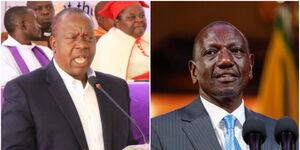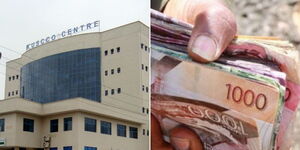It may just be a coincidence but the figure Ksh137 Billion has appeared in seven instances of government projects and Kenya's international trade relations.
A collection of newspaper articles has brought to light this trend that seems to be a dominating figure in Kenya's economy.
1. Tax evasion costs Kenya Ksh137 Billion
In February 2015, an African Union panel report revealed that multinationals and business people have been costing Kenya Ksh137 Billion annually through tax evasion and other forms of fraud.
"African countries like Kenya need to prioritise on sealing the leakages (of money) out of their economies, as they would be able to have sufficient resources to fulfill development goals,” the document prepared by a team led by former South African President Thabo Mbeki read in part.
[caption caption="The Nation newspaper"] [/caption]
[/caption]
2. On the same date, the Nation published an article titled: "Treasury Seeks an Extra Ksh137 Billion to Finance Major Growth Projects" where Treasury CS Henry Rotich published a draft budget policy statement which he was set to table before parliament.
“It is proposed that these expenditures be funded through expenditure rationalisation and additional domestic borrowing,” CS Rotich noted at the time.
3. To keep up with the trend, data released by the US Department of Commerce showed that American exports to Kenya more than doubled to Ksh137 Billion during the 2014-15 period.
"US exports to East Africa’s largest economy rose to Ksh 137.46 Billion from Ksh 54.4 Billion the previous year — representing a 165.3 percent growth," the report read in part.
US Commercial Counsellor to Kenya Francis Peters stated: “This demonstrates growing trade relations between America and Kenya."
[caption caption="Screenshot of BusinessDaily article"] [/caption]
[/caption]
4. Kenya-UK trade hit Kshs 137 Billion mark.
Four years earlier, Kenya’s High Commissioner, Ephraim Waweru Ngare had stated that the aggregate trade hit the mark because Kenya had established a niche market for the country’s signature products including tea, coffee, flowers, fruits and vegetable, making Britain once again the largest importer after Uganda.
His sentiments were made when Kenya was celebrating its 48th Jamhuri ceremony.
[caption caption="Screenshot of The Standard article"] [/caption]
[/caption]
5. In January 2014, Treasury CS Rotich appeared before the parliamentary Public Investments Committee (PIC) where he testified that part of the SGR loan amounting to Kshs 137 Billion would attract an interest of Kshs 31.5 Billion per annum for 20 years.
“The total Chinese loan will amount to Ksh375.8 billion (85 percent) while the government counterpart funding is Ksh49 billion (15 percent) to bring the cost to Ksh424.9 billion,” CS Rotich further told the committee.
[caption caption="Screenshot of Nation article"] [/caption]
[/caption]
6. Back in 2015, the same figure came up after it was announced that interest on domestic debt stood at Ksh 137.6 Billion, a figure which was expected to rise in the following financial year.
[caption caption="Screenshot of Nation article"] [/caption]
[/caption]
7. Another instance falling Ksh7 Billion short of the magic mark was how much money Kenyans in the diaspora sent back home in 2013.
According to statistics released by the Central Bank of Kenya, remittances from Kenyans in the diaspora rose by 11 percent in 2013 with North America retaining its position as the key source of foreign cash inflows for Kenya.
"Kenyans living abroad remitted Ksh130.1 Billion compared to Ksh116.3 Billion remitted the previous year," the report read in part.
[caption caption="Screenshot of Nation article"] [/caption]
[/caption]












